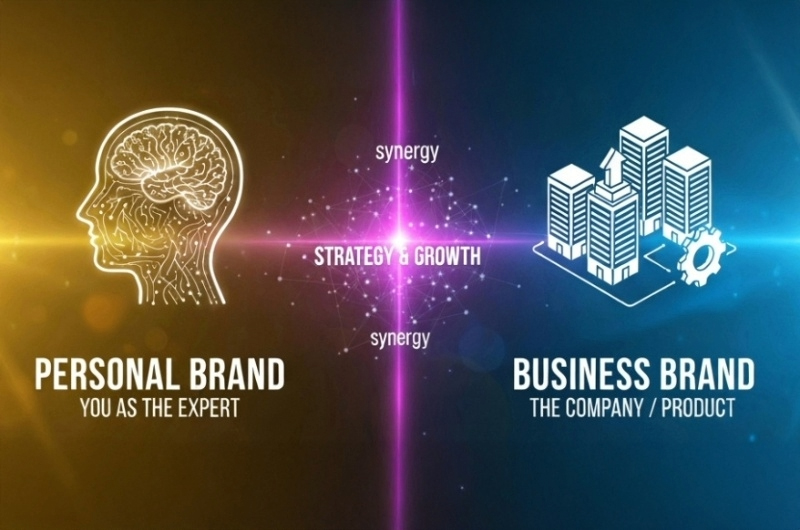Why Personal Branding Is Essential for Building Consumer Trust in 2025 and Beyond

The Critical Role of Personal Branding
Personal branding is the intentional creation and management of a unique identity for an individual or company. In today’s hyper-connected and competitive environment, it’s no longer optional but a strategic imperative. A strong personal brand ensures you’re memorable, trusted, and seen as credible—essential qualities that foster deep, lasting connections and business growth.
Why does this matter now more than ever?
The rise of digital platforms and social media has transformed how consumers evaluate brands and leaders. People want to connect with authentic individuals behind the brand, not faceless corporations. According to Edelman’s 2023 Trust Barometer, 82% of consumers are more likely to trust companies whose leaders engage transparently and consistently online. This trust translates directly into consumer behavior and brand loyalty.
Data confirms the impact: CEOs and employees influence 65% of consumers’ purchase decisions (Explodingtopics). Employees, on average, boast social media followings ten times larger than their company’s official pages (LinkedIn). This vast reach positions employees as powerful brand ambassadors and amplifiers of trust.
Despite this, only 40% of C-level executives actively cultivate a personal brand, compared to 70% of entrepreneurs and 60% of influencers (MentorEU). The hesitation often stems from lack of time, expertise, or confidence with digital channels. Yet, the cost of inaction is steep: brands risk losing relevance and consumer trust in an era where transparency and values are paramount.
Younger consumers, especially Millennials and Gen Z, expect more from leaders. About 50% of Millennials want CEOs to address social and environmental issues (The CEO Magazine). This shift signals that corporate social responsibility is no longer just PR—it’s a core expectation that personal branding can highlight.
Personalization Is a Game-Changer
The modern consumer demands personalized, relevant experiences. According to Statista, 97% of brands personalize marketing to some extent, with 77% of shoppers more likely to buy from brands that do so. Personalization fosters emotional connection, increases engagement, and drives conversion rates.
Employee advocacy magnifies this effect: content shared by employees on social media generates 561% more reach than official brand accounts (Hanna L.). Authentic stories from real people resonate more strongly, enhancing brand credibility.
Additionally, consumers are becoming savvier researchers. Approximately 40% actively investigate brand values, guidelines, and practices before buying (G2). Poor employer reputation can have a tangible business impact—64% of shoppers say they have stopped buying from brands known for bad workplace culture or unethical practices (Career Arc).
The Rising Importance of CEO Personal Brands
Leadership visibility drives brand trust and employee engagement. Yet, just 40% of C-level executives have a robust personal brand presence. This gap represents a missed opportunity. Authentic CEO engagement humanizes the brand, builds transparency, and fosters relatability. Studies show that companies with strong executive visibility enjoy higher employee morale, retention, and customer loyalty.
Millennials especially value leaders who demonstrate purpose and social consciousness. 50% expect CEOs to speak on societal issues and take action (The CEO Magazine). Furthermore, transparent CEO communications during crises build trust and stabilize brand reputation.
Employee Advocacy: A Hidden Asset
Employees’ social networks are approximately ten times larger than official corporate accounts (LinkedIn). This means employee-driven content reaches far beyond traditional marketing efforts. When employees share authentic stories about their work and values, it creates peer-to-peer trust that is invaluable.
Organizations investing in employee advocacy report stronger brand credibility and increased sales leads. Companies with active employee advocates see up to 20% more engagement on social posts and 13% higher sales win rates (Hanna L.).
Why Values and Personalization Matter More Than Ever
Consumers today prioritize authenticity and alignment of values. According to G2, 84% of consumers prefer brands that share their values, and 77% engage more deeply with personalized experiences. This trend extends beyond marketing into personal branding: individuals who openly share their mission and values cultivate stronger audience connections and trust.
Incorporating consistent messaging around purpose and personalization builds not only a brand but a community of loyal supporters who feel personally connected.
Practical Steps to Build a Trustworthy Personal Brand
- Be Visible and Authentic: Share your expertise, insights, and passion through blogs, videos, and social media. Genuine storytelling fosters trust.
- Engage Thoughtfully on Social Platforms: LinkedIn, Twitter, and industry forums provide opportunities to connect with peers, clients, and prospects.
- Empower Employees: Encourage your team to tell their own stories and develop personal brands aligned with company values.
- Lead with Purpose: Clearly define and communicate your values and mission. Consistency is key to building credibility and loyalty.
The Bottom Line
Personal branding is no longer optional—it’s a foundational element of trust-building and competitive advantage. Whether you’re a CEO, entrepreneur, or employee, cultivating an authentic, values-driven personal brand creates meaningful connections, drives loyalty, and ultimately supports sustainable success.
Sources: Explodingtopics | LinkedIn Business | MentorEU | The CEO Magazine | Statista | Hanna L. | Edelman Trust Barometer | G2 Learn Hub | Career Arc
Ready to Build Your Personal Brand?
At TruBrand, we specialize in helping professionals and business leaders craft powerful, purpose-driven personal brands that resonate with their audience and build lasting trust. Contact us today to start your journey towards creating a brand that stands for something meaningful.





